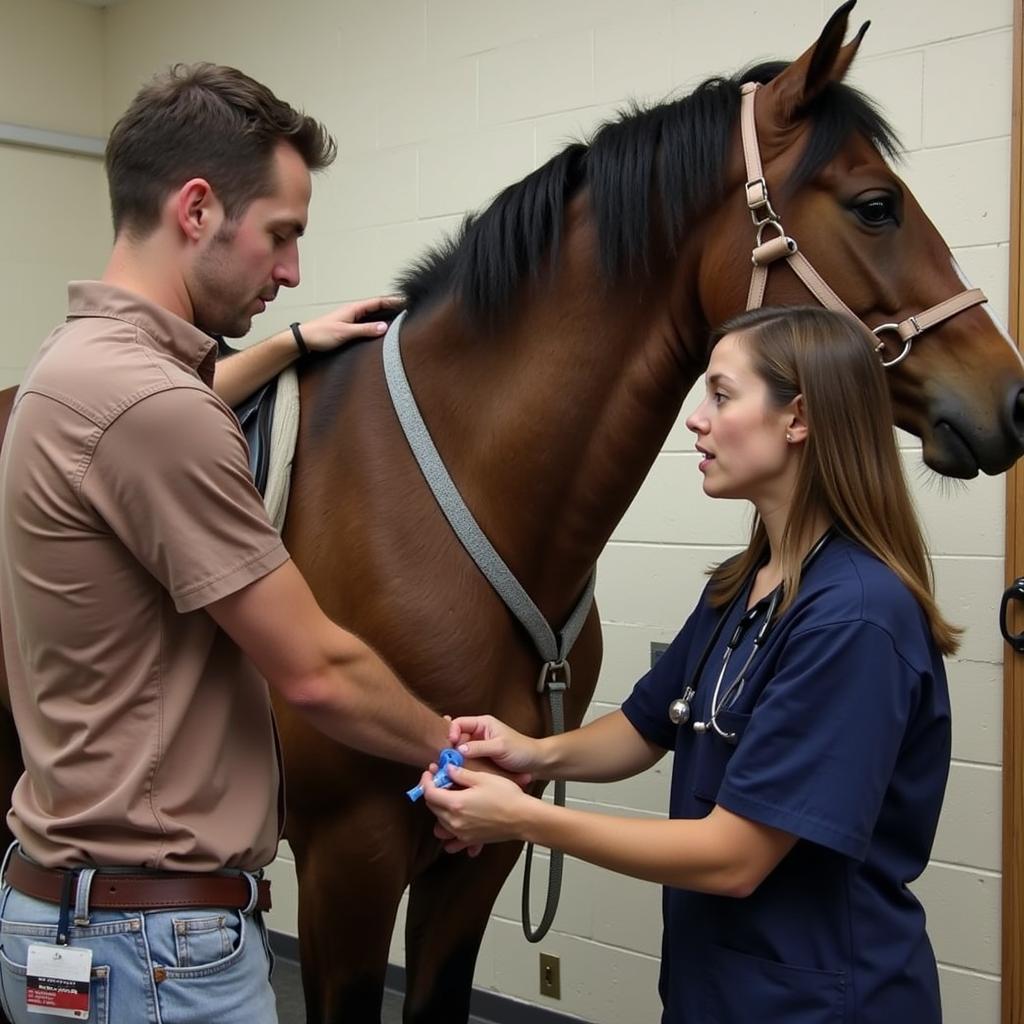Acepromazine, often referred to as “Ace,” is a commonly used tranquilizer in veterinary medicine, particularly for horses. Understanding the proper acepromazine dosage for horses is crucial for ensuring their safety and well-being. This guide will delve into the intricacies of Ace usage in horses, covering appropriate dosages, potential side effects, and important considerations for horse owners.
Understanding Acepromazine for Horses
Acepromazine is a phenothiazine derivative that acts on the central nervous system, producing a calming and sedative effect. It’s important to note that Ace is a tranquilizer, not a pain reliever. While it can reduce anxiety and make a horse appear calmer, it doesn’t alleviate pain. This is a critical point for owners to understand. Using Ace for a painful procedure without adequate analgesia can be detrimental to the horse’s welfare.
 Administering Acepromazine to a Horse
Administering Acepromazine to a Horse
Acepromazine Dosage for Horses: What You Need to Know
The appropriate acepromazine dosage for horses varies depending on several factors, including the horse’s size, age, temperament, and the intended purpose of administration. A veterinarian should always be consulted to determine the correct dosage for your horse. Generally, the dosage ranges from 0.02-0.08 mg/kg intravenously (IV) or intramuscularly (IM). Lower doses are typically used for mild sedation, while higher doses are reserved for more significant procedures, such as transportation or minor surgeries. Overdosing can lead to serious complications, including collapse and even death.
“Always consult with your veterinarian before administering any medication to your horse, including Acepromazine,” advises Dr. Emily Carter, DVM, specializing in equine medicine and surgery at Equine Wellness Center. “They can assess your horse’s individual needs and determine the safest and most effective dosage.”
Potential Side Effects of Acepromazine in Horses
While generally considered safe when administered appropriately, acepromazine can have potential side effects. These can include:
- Penile Prolapse: This is a relatively common and potentially serious side effect in male horses, where the penis protrudes and becomes difficult to retract.
- Hypotension: Ace can lower blood pressure, which can be a concern, especially in horses with pre-existing cardiovascular issues.
- Ataxia: Loss of coordination and stumbling can occur, particularly at higher doses.
It’s essential to monitor your horse closely after administering Ace and report any unusual signs to your veterinarian immediately.
When to Avoid Using Acepromazine in Horses
Certain circumstances warrant caution or avoidance of acepromazine use in horses. These include:
- Pregnancy: Ace is generally contraindicated in pregnant mares, especially during the later stages of gestation.
- Breeding Stallions: Ace can cause penile prolapse, which can have implications for breeding.
- Horses with Liver or Kidney Disease: These organs play a crucial role in metabolizing the drug, and compromised function can increase the risk of adverse reactions.
- Horses undergoing strenuous activity: The combined effects of Ace and strenuous activity can further compromise cardiovascular function.
“Acepromazine can be a valuable tool when used responsibly and under the guidance of a veterinarian,” states Dr. John Miller, DVM, an experienced equine practitioner with over 20 years of experience. “Understanding the potential risks and benefits is crucial for ensuring the horse’s well-being.”
Conclusion
Acepromazine can be a useful tool for managing anxiety and facilitating certain procedures in horses. However, responsible usage is paramount. Always consult with your veterinarian to determine the appropriate acepromazine dosage for your horse and to discuss potential risks and benefits. Careful monitoring after administration is essential to ensure the horse’s safety.
FAQs
- Can I give my horse Ace without consulting a vet? No, always consult a vet before administering any medication.
- Is Ace a painkiller? No, Ace is a tranquilizer, not a pain reliever.
- What are the common side effects of Ace in horses? Penile prolapse, hypotension, and ataxia.
- When should Ace be avoided in horses? Pregnancy, breeding stallions, liver/kidney disease.
- What if my horse experiences side effects after receiving Ace? Contact your veterinarian immediately.
For further information, explore resources on thiamine b1 for horses, selenium supplement for horses, or ground flax seed for horses. You might also find our articles on cbd horses and dorm for horses helpful.
Need assistance? Contact us at Phone: 0772127271, Email: [email protected] or visit us at QGM2+WX2, Vị Trung, Vị Thuỷ, Hậu Giang, Việt Nam. Our customer service team is available 24/7.